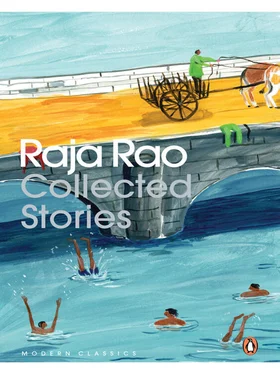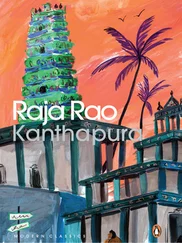Raja Rao - Collected Stories
Здесь есть возможность читать онлайн «Raja Rao - Collected Stories» весь текст электронной книги совершенно бесплатно (целиком полную версию без сокращений). В некоторых случаях можно слушать аудио, скачать через торрент в формате fb2 и присутствует краткое содержание. Год выпуска: 2014, Издательство: Penguin, Жанр: Классическая проза, на английском языке. Описание произведения, (предисловие) а так же отзывы посетителей доступны на портале библиотеки ЛибКат.
- Название:Collected Stories
- Автор:
- Издательство:Penguin
- Жанр:
- Год:2014
- ISBN:нет данных
- Рейтинг книги:5 / 5. Голосов: 1
-
Избранное:Добавить в избранное
- Отзывы:
-
Ваша оценка:
- 100
- 1
- 2
- 3
- 4
- 5
Collected Stories: краткое содержание, описание и аннотация
Предлагаем к чтению аннотацию, описание, краткое содержание или предисловие (зависит от того, что написал сам автор книги «Collected Stories»). Если вы не нашли необходимую информацию о книге — напишите в комментариях, мы постараемся отыскать её.
Collected Stories — читать онлайн бесплатно полную книгу (весь текст) целиком
Ниже представлен текст книги, разбитый по страницам. Система сохранения места последней прочитанной страницы, позволяет с удобством читать онлайн бесплатно книгу «Collected Stories», без необходимости каждый раз заново искать на чём Вы остановились. Поставьте закладку, и сможете в любой момент перейти на страницу, на которой закончили чтение.
Интервал:
Закладка:
Shivlal lying on his Ganga ghat bed had rehearsed again and again the events. First Grandfather’s sudden death— he looked so like a tiger himself, but in death he looked a saint when they went to touch his feet, before they took his body away. Then the father’s death — he died a few years later, returning after watching the workmen on his fields, he had dysentery and the rain had come, and you can’t wait for the sprouts to rise — and no sooner the father was carried away and cremated by the river (amidst those tall flowing acacia trees), the uncle being the younger and having seen more of the city than anyone had (and now he was, as it were, the master of the Household) — he put his nephews and niece, three boys and a girl, all on the streets. ‘There’s much water in the river,’ he said to the weeping widow, ‘and much tamarind on the tree, and the good God has given all the world for a home.’ Now, what had a poor woman done? Nothing except she be the elder brother’s wife, and she ran the household. If she did it not, tell me, who else should? And the younger sister-in-law, of course, came from a house with a horse and carriage and many lamps on the veranda, and one cannot trust her, could you, like one does everybody? Besides they also said, she and her family were great worshippers of talismans and dark-mantras and marsh-creatures and the nail-driving-in-the-courtyard stuff. You had just to see how this Rudrabai pared her nails and put them away under your ears with many a secret saying, thus showing she was not to be trusted with your baby. And she painted strange unguents behind the lobes of her ears and on her pretty, pretty toes. Life is that way. And three days before he died, had she not, that youngsome witch, not gone on that dark night somewhere, and there were all those whisperings, soft steps, silences, and goings-on. Yes, it was not dysentery— it was they that did it, the spirits. He had been frightened several times on the road coming from Sunderpur fair — and he was no coward. He saw shapes, faces, he said. He got fever again and again. And then the dysentery, and now the death. Who did it— she .
You see the uncle had a licence and a gun. He had been to the city and had learnt shooting. And since there were so many tigers hearabouts, and he had probably bribed Abdul Khan, the Sub-inspector of Police (and maybe they even went to the prostitute together), so came the gun. Now the important thing about a gun is just this: you’ve only to polish it every morning (with that evil smelling oil) on the veranda, and the whole village respects you. Not only the village but even the elder brother. Of course you stand up when your elder brother comes in, but at the root of your heart (and especially in the heart of that scorpion called Rukmini) you want the Eight-pillared House all to yourself. Already the Government Revenue Inspector, the Police Sub-inspector (a new one this time), the Cotton Merchant’s agent Shiva Sunder Das, they all came, came to see him, and some even came in taxi-cars. One day they’d all come and be the guests of Maganlal, the uncle. Why should not one be rich, I ask of you? Why, there are so many rich people in Bombay. You could have a car, and have a driver to drive your car, and take your wife on a drive like the rich do on Malabar Hill, Bombay. Why should not civilization come to Vallabhpur. The first thing is to sport a Western jacket, and buy your wife Bata slippers. With jacket and Bata slippers you can drink the best air God ever offered on earth.
Shivlal’s father was too simple. He wanted to be (like his own father), a just and a true landowner. His younger brother, however, now dreamt of a cotton-ginning mill. Koo kooo koooo , the whistle would go and the machine would chug, and bullock carts waited at your door to get paid. The world is no more made for the plough and pounding pestle. Get up, brother, and come to the city. A mill in town is the city in your pocket. And money would flow into the safes. Big people will come to visit you. And your daughter, now four years old, would one day go to the Hunter College, Nagpur (CP).
It’s not so easy to buy ginning mill equipment. You have to sell the land, and buy this tremble mumble machine. If your elders protest what do you do? You go on dreaming and scheming with your friends, in town. Friends indeed whom you meet at the drink shop or at Shanta Bai, the dancing girl. And big schemes were made. (The licence came, and the gun played its part.) There was not a man, fifty miles around, who could twirl a moustache, a gun between his legs. Everybody is not lucky. But does the gun always bring luck? What if it brought murder. Also when you have a gun you are with the British. When you are with the British alone can you win. Wars come and you go up. The picture of Gandhi on your wall is a disgrace for so important a landowning family. There was that big story of a murder in Bilaspur. A young widow was found murdered — she was found with a Muslim lover. Communal riots were feared. You could patrol the streets now, gun in hand (the Government allowed you to), and the whole district fell into your palm. Everybody feared you, feared anybody who’d a gun. From then on to the sale of the land (the brother gave in, he was so silent and good) and within a few months city cars came to stand at your door. Money came from everywhere. Who would not trust you now that you’d so many rich at your door. Meanwhile the rusty old brother died. So much less sneeze and cough in the world. An old fogey who lived as if the train had not been invented by man, or the aeroplane. The wife’s makings must certainly have worked, too.
Maganlal (the uncle) occupied the whole house, and there was not a soul in the entire district who would save a widow and her four children from despoliation. After this the story is simple. The widow threw herself into the temple tank, thus she could haunt that sister-in-law (with Bata slippers and all, like a cinema star) forever. Ramlal, the elder of the boys, got engaged as a cook by the Dholpur Stationmaster and looked after the family, from afar, as well as he could.
One day (after long years of honourable service) Ramlal took the train (when his master was away visiting his family) — Ramlal, so one heard, became a cook on Malabar Hill, Bombay. (So much had Malabar Hill become a part of the Vallabhpur imaginationings.) Sankerlal the second son grew wise, and used to be a bicycle shop assistant, then married his boss’s niece (the boss had no children of his own) and now dreamt of revenge, and motor cars. He is the only one who will not leave the district. Either that Gunman (that’s what he called his uncle) is dead and cremated, or I. The father’s death will be avenged. Now and again when the gay aunt comes to town, he stands at his shop door and shouts: ‘Hé prostitute, with which officer are you sleeping today?’ For such things do happen, you know, and now that the mill is prosperous and the Gunman is all-powerful, who can know where the money came from? But our Sankerlal too had made some money (in wartime the bicycle-taxi is good trade, you know, and the poor Gandhi-men need bicycles for the wide propagation of the Gandhi faith). And now the case will soon go up before Sessions Court. The lawyer Jagath Ram is hopeful. The British would anyway go soon. And under the Gandhi Government there will be no place for a wicked creature like the Gunman. The British will go, and we will have a just and non-violent Raj.
The British have now gone, and it’s so long ago. The Gunman became in the course of a single, single moon, a Gandhi-man, and is now president of the Chanda District Congress Committee. His mills run better than ever — in fact he has three of them now. His wife wears high-heeled slippers, and even speaks titter-mitter English, so they say. Their children go to convent schools, of course.
Читать дальшеИнтервал:
Закладка:
Похожие книги на «Collected Stories»
Представляем Вашему вниманию похожие книги на «Collected Stories» списком для выбора. Мы отобрали схожую по названию и смыслу литературу в надежде предоставить читателям больше вариантов отыскать новые, интересные, ещё непрочитанные произведения.
Обсуждение, отзывы о книге «Collected Stories» и просто собственные мнения читателей. Оставьте ваши комментарии, напишите, что Вы думаете о произведении, его смысле или главных героях. Укажите что конкретно понравилось, а что нет, и почему Вы так считаете.












